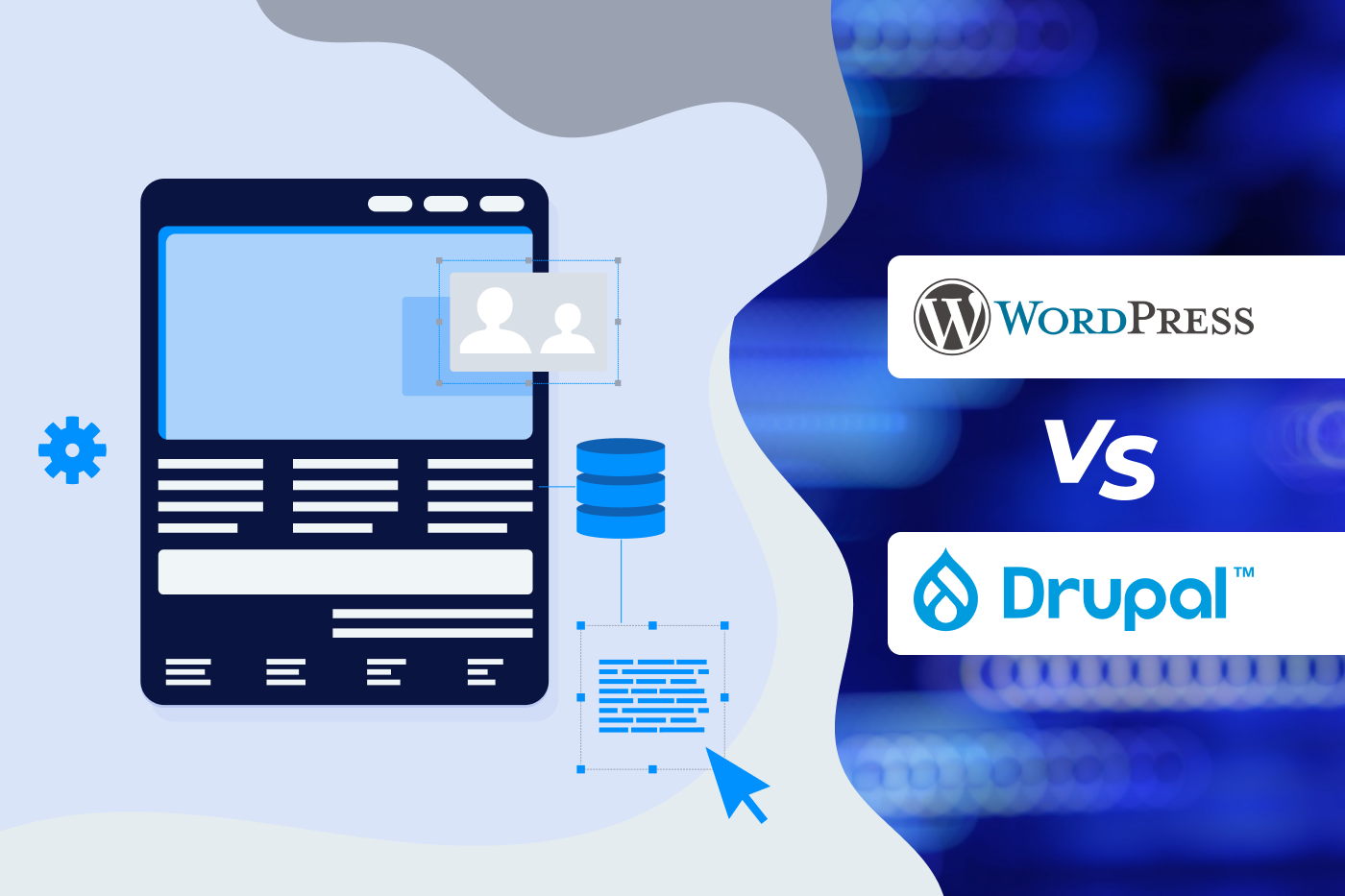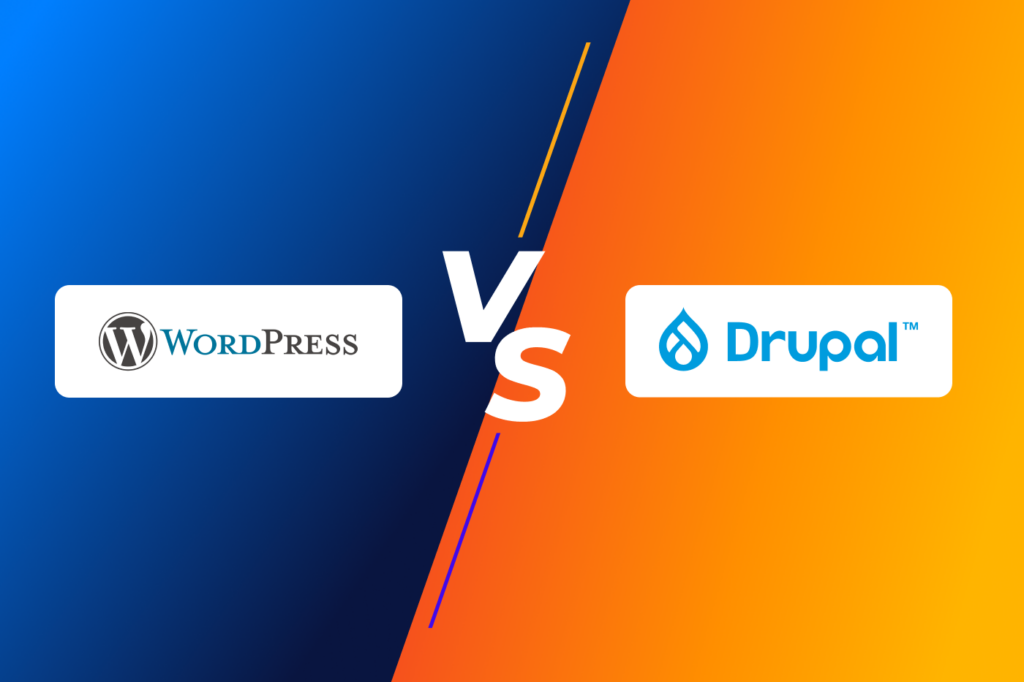Drupal vs. WordPress! If you’re thinking about building a custom website, one of the first decisions is choosing the right Content Management System (CMS). Two of the most popular options are Drupal and WordPress. While WordPress is widely known for its simplicity, Drupal is valued for its flexibility and robust security. In this guide, we’ll dive into the essentials of Drupal 11 and WordPress, comparing their strengths, limitations, and unique features to help you make an informed choice for your website.
Understanding Drupal 11 and WordPress CMS
What is Drupal 11?
Drupal is the latest version of the popular open-source CMS, known for its customization options and suitability for complex, data-heavy websites. Drupal is favored by developers and large organizations because it allows for high-level customization and advanced content structuring. While Drupal has a steeper learning curve, its latest version, Drupal 11, introduces new features to improve usability and performance, making it more accessible than previous versions.
What is WordPress?
WordPress is the most popular CMS worldwide, powering over 40% of all websites. Initially designed as a blogging platform, WordPress has evolved to support various website types, from portfolios and e-commerce sites to business websites. WordPress’s appeal lies in its user-friendliness and extensive plugin ecosystem that enables anyone, even beginners, to create and customize a website with minimal technical knowledge.
Key Differences Between Drupal 11 and WordPress
Ease of Use
WordPress is generally easier to use for beginners. Its interface is straightforward, and its large library of plugins allows you to add functionality without coding. WordPress also offers a wide range of themes, making it simple to launch a polished website quickly.
Drupal 11, on the other hand, requires some technical knowledge. The CMS is more developer-focused and may not be as intuitive for beginners. However, for those who have technical skills, Drupal’s interface allows for deep customization and flexibility that WordPress doesn’t provide out of the box.
Flexibility and Customization
WordPress offers thousands of plugins and themes, making it highly customizable. While customization can be extensive, WordPress sites often rely on third-party plugins, which may sometimes lead to compatibility issues or slow down your site.
Drupal is inherently flexible. With its modular approach, Drupal allows for complex customization without over-relying on third-party add-ons. Developers can create highly personalized content types, taxonomies, and custom fields that are essential for complex or high-performance sites. Drupal themes and modules are generally robust and made with large-scale, high-traffic websites in mind.
Security
Security is a significant strength for Drupal. Known for its strong security framework, Drupal is often chosen by government institutions, universities, and other organizations that handle sensitive data. Drupal’s community rigorously reviews code, which helps maintain high security standards.
WordPress is secure when set up correctly, but its popularity makes it a common target for hackers. Many vulnerabilities come from third-party plugins, so choosing quality plugins and keeping them updated is essential. WordPress also offers numerous security plugins to enhance protection.
SEO Capabilities
Both Drupal and WordPress have strong SEO capabilities, but they approach it differently:
WordPress has many SEO plugins, like Yoast SEO, that make optimizing your site straightforward. It’s easy to edit meta descriptions, titles, and keywords, even for non-technical users.
Drupal has powerful SEO tools as well, but they are more developer-focused. Drupal’s SEO module can handle custom meta tags, URL structures, and more technical SEO aspects, making it a strong choice if you’re experienced with SEO.
Performance and Scalability
For performance and scalability, Drupal is often the better choice, especially for larger, data-intensive sites. Drupal 11 is optimized for high performance and can handle large-scale websites without performance issues.
WordPress is also highly scalable with the right setup, but you may need caching plugins and content delivery networks (CDNs) to ensure high performance as your site grows. For small to medium-sized sites, WordPress performs well and can be optimized effectively.
Which CMS is Right for You? Answering Key Questions
Choosing the right CMS depends on your website needs and the type of experience you want. Here are some questions to help guide your decision:
What Level of Customization Do You Need?
If you need extensive customization and flexibility for a complex site, Drupal might be your best option. Its ability to manage and structure content uniquely makes it ideal for websites with large amounts of data or complex user flows. WordPress, however, is fantastic if you want a site with pre-made options that you can customize without much coding.
How Important Is Security?
If security is a top priority (e.g., government, financial, or healthcare websites), Drupal is often the preferred CMS due to its rigorous security protocols. WordPress can be secure, but it requires consistent monitoring, especially if you rely heavily on third-party plugins.
How Much Time Can You Commit to Learning?
WordPress is beginner-friendly, so if you need a site up quickly and don’t have time to learn complex systems, WordPress is likely the better choice. Drupal requires a steeper learning curve but pays off if you’re willing to invest time in understanding its powerful features.
Do You Need a High-Performance Site?
If you expect heavy traffic or need high performance, Drupal is known for handling large-scale sites efficiently. WordPress can also perform well with optimizations but may require additional plugins for caching and speed.
Conclusion
Both Drupal 11 and WordPress are powerful CMS platforms, each with its strengths and ideal use cases. If you’re looking for flexibility, strong security, and high performance, Drupal is an excellent choice for complex sites. If you prioritize ease of use, a quick setup, and a vast selection of plugins, WordPress might be your best bet.
When deciding between the two, consider your website’s complexity, security needs, and the time you’re willing to invest in managing the platform. With either option, you’ll have a robust CMS that can support your custom website goals.




